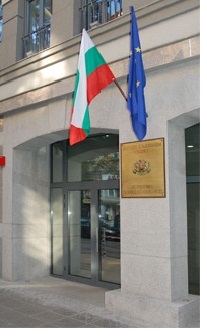
HISTORY
The Supreme Judicial Council (SJC) is a supreme administrative body of the judiciary, established under Articles 130-133 of the Constitution of the Republic of Bulgaria. For the first time, its organization and activity were laid down in the Law on the Supreme Judicial Council, in force as of 13 July 1991 until 25 July 1994. In accordance with that Law, its first composition was constituted on 27 September 1991.
The Supreme Judicial Council shall be a standing body, which represents the judiciary, ensures and stands for its independence.
With the latest amendments of the Constitution of the Republic of Bulgaria and the Judiciary System Act, substantial amendments regarding the structure and the activity of the Supreme Judicial Council were introduced.
The Supreme Judicial Council shall act in compliance with the principles of legality, independence, proportionality, authenticity, equality, autonomy, accessibility, publicity and transparency, consistency and predictability.
The Supreme Judicial Council shall have a round stamp bearing the image of the coat of arms of the Republic of Bulgaria and the words “Republic of Bulgaria. Supreme Judicial Council”.
COMPOSITION AND MANDATE
The Supreme Judicial Council shall be composed of 25 members, who shall be elected among legal practitioners with high professional and moral qualities and at least fifteen years of practice. The Supreme Judicial Council shall be a standing body, a legal person having its seat in Sofia. It shall be represented by one of its elected members, nominated by a decision of the Plenum of the Supreme Judicial Council.
The National Assembly shall elect eleven members of the Supreme Judicial Council, six of whom - for the Judges’ College and five - for the Prosecutors’ College. The election by Colleges shall be made from among judges, prosecutors, investigators, academic-degree-holding scholars in legal sciences, lawyers and other jurists of high professional standing and moral integrity, taking into account their professional qualification and specialization.
Judges shall elect from among their number six members of the Supreme Judicial Council for the Judges’ College.
Prosecutors shall elect from among their number four members of the Supreme Judicial Council for the Prosecutors’ College.
Investigating magistrates shall elect from among their number one member of the Supreme Judicial Council for the Prosecutors’ College.
The mandate of the elected members of the Council shall be five years. They cannot be reelected for two consecutive mandates. The President of the Supreme Court of Cassation, the President of the Supreme Administrative Court and the Prosecutor General have seven-years mandate. They shall be appointed by the President upon a proposal of the Council and shall be its ex offcio members.
POWERS
The Supreme Judicial Council shall represent the judiciary, ensure and stand up for its independence, determine the composition and the organization of the work of courts, the prosecutor’s offices and the bodies of the investigation and secures financially and technically their activity, without interfering in its implementation, being guided by the functions entrusted to it by the Constitution of the Republic of Bulgaria and the Judiciary System Act. The powers of the Council shall be executed through Plenum, Judges’ College and Prosecutors’ College.